Graduate students
Maggie Jones
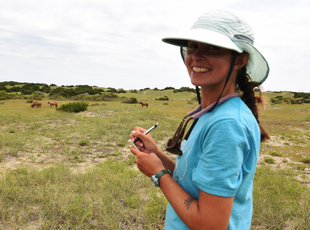
Maggie earned her Masters degree at Iowa State University, studying how changes in the behavior of contracepted mares affects band stallion behavior. Specifically, she investigated whether band stallions exposed to increased levels of mare infidelity 1) engage in male-male contests more often, 2) engage in more highly escalated contests, or 3) demonstrate increased cortisol levels. Finally, Maggie explored how all of this activity correlates with the surrounding ecology. You can read about some of what she found in her papers, "Decreased female fidelity alters male behavior in a feral horse population managed with immunocontraception" and "Rising up to the challenge of their rivals: Mare infidelity intensifies stallion response to playback of aggressive conspecific vocalizations".
Ben Johnson

Ben earned his Masters degree at Iowa State University. He conducted both a comprehensive review of the ungulate vigilance literature and a survey of visitors to Glacier National Park to better understand not only how wildlife responds to human activity, but also to determine how people's beliefs and attitudes affect their behavior around wildlife.
Ben earned his Masters degree at Iowa State University. He conducted both a comprehensive review of the ungulate vigilance literature and a survey of visitors to Glacier National Park to better understand not only how wildlife responds to human activity, but also to determine how people's beliefs and attitudes affect their behavior around wildlife.
Undergraduate students
Rachel Schwartzbeck

Rachel helped our lab investigate changes to male behavior in response to mare contraception for her Dean’s Leadership Scholar Scholarship at Iowa State University. Rachel created a database of stallion fighting behavior and entered data on male-male contests that took place prior to the contraception program on Shackleford Banks. These pre-contraception contests were compared to more current, post-contraception contests. Rachel helped collect those data in the summer of 2016. With Rachel’s contribution, we have a better understanding of how behavioral and physiological changes in contracepted individuals can affect the behavior and physiology of their untreated associates. Exploring such effects is especially important to the management and conservation of social species.
Tamara Ford
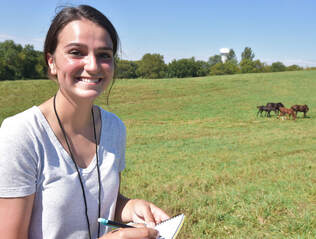
Tamara worked with the Science With Practice program at Iowa State University to better understand how the mother-offspring relationship can affect mare and foal stress at weaning time. Tamara's study revealed an important disconnect between behavioral and physiological measures of foal stress during weaning. Her results demonstrated the importance of monitoring both behavior and physiology when questioning the effects of husbandry practices on animal stress. She presented her findings in a poster at the Science With Practice Poster Symposium in December, 2018.
Brienna Ross
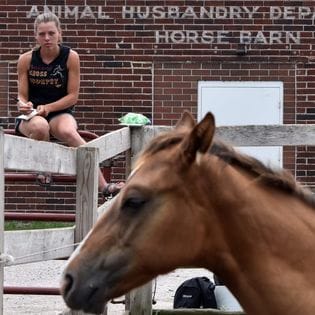
Bri investigated how the mare-foal relationship may (or may not) ameliorate stressful situations in domestic horses. She conducted her project with the Science With Practice. program at Iowa State University. Specifically, she was interested in determining whether mares and foals that exhibit more synchronous behaviors prior to weaning demonstrate lower cortisol levels (less pronounced physiological stress responses) during and after weaning. She presented her findings in a poster at the Science With Practice Poster Symposium in December, 2016.
Micah Fatka
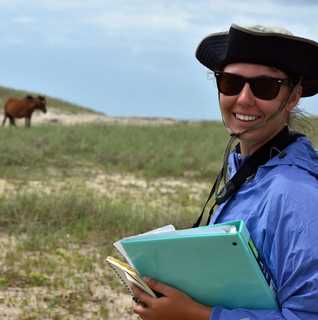
Micah conducted her project on contraception and mare sociality with the Science With Practice. program at Iowa State University. Micah was interested in whether contraception-related changes in behavior affect mare aggression rates and their connectedness with other members of their bands, including both other mares and the band stallion(s). Micah produced a poster outlining her results.
Anderson Grant
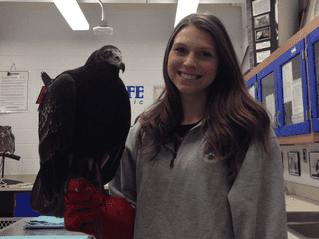
As a senior majoring in Animal Ecology at Iowa State University, Andie volunteered at ISU’s Wildlife Care Clinic where she investigated the effects of stress on time to recovery in injured barred owls for her senior honors project. Andie quantified behavioral responses to treatment, validated her behavioral metrics with measures of fecal corticosterone, and correlated these factors with time in captivity and patient recovery. Her research will help enable doctors and handlers to better recognize and mitigate stress in their avian patients, potentially reducing the time to recovery from injury. In April, 2016, Andie presented her findings in a poster at ISU's Honors Poster Presentation.
Haley Carr
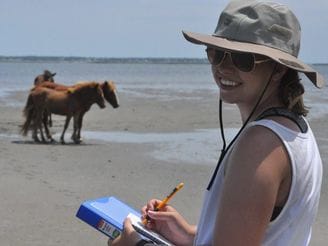
Haley studied mare recovery from contraception management while participating in Iowa State University's Science With Practice program. Specifically, she monitored the number of group changes that mares make and the amount of reproductive behaviors they exhibit towards and receive from their stallions. She showed that these behaviors are correlated with the number of contraception treatments that mares received from 2000-2009. She presented her findings in a poster at the Science With Practice Poster Symposium in December, 2015 and published them in our paper, "Lingering effects of contraception management on feral mare (Equus caballus) fertility and social behavior".
